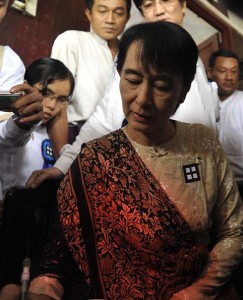The Spirit of the 1988 Uprising Lives On – Activists Call for UN Commission of Inquiry
By Burma Partnership • August 8, 2011 Twenty-three years after the 8 August 1988 nationwide people’ s uprising, groups inside Burma and around the world hosted events that demonstrated that the desire for freedom remains as strong today as it was in 1988. On that fateful day in 1988, hundreds of thousands of people, young and old, men and women, from all walks of life and a range of ethnic groups, took to the streets as part of a student led movement for democracy. Burma’s military regime, headed by General Ne Win, sensed a profound threat to its grip on power and cracked down hard on the protesters, killing at least 3,000 and imprisoning and torturing many thousands more.
Twenty-three years after the 8 August 1988 nationwide people’ s uprising, groups inside Burma and around the world hosted events that demonstrated that the desire for freedom remains as strong today as it was in 1988. On that fateful day in 1988, hundreds of thousands of people, young and old, men and women, from all walks of life and a range of ethnic groups, took to the streets as part of a student led movement for democracy. Burma’s military regime, headed by General Ne Win, sensed a profound threat to its grip on power and cracked down hard on the protesters, killing at least 3,000 and imprisoning and torturing many thousands more.
In the wake of the protests, General Ne Win stepped down and handed over the power to his juniors through a “coup” on 18 September, continuing the campaign against the pro-democracy movement with another round of shooting, killing and imprisoning the movement’s leaders and anyone who dared oppose the military regime. More than 10,000 people fled to Burma’s borders to join the ethnic resistance groups and carry on the struggle from the border regions. Freedom of speech, assembly, expression, and the press have been non-existent in Burma throughout the past twenty-three years, something which has not changed since the 2010 elections and the convening of a military-dominated parliament. The regime continues to violate citizens’ human rights, particularly with extrajudicial killings, rape and sexual violence, forced labour, arbitrary arrest and imprisonment, torture, and forced displacement, amidst escalating armed conflict in ethnic areas.
To remember those who sacrificed their lives for their country and to keep their dreams of freedom alive, Burma Partnership, Assistance Association for Political Prisoners – Burma, Forum for Democracy in Burma, Students and Youth Congress of Burma, Nationalities Youth Forum and Thai Action Committee for Democracy in Burma held a panel discussion this evening entitled, “23 Years of Resistance: Ongoing Human Rights Abuses and the Urgent Need for a Commission of Inquiry” in Bangkok, Thailand. In Rangoon, an estimated 1,000 individuals gathered for an event at which Daw Aung San Suu Kyi asked that everyone to “think about the reason [we] cannot forget 8.8.88.” Proving that the 8.8.88 uprising has not been forgotten, demonstrations commemorating the people’s movement also took place today in Mandalay and other locations within Burma, as well as in the Philippines, Indonesia, India, Israel, the United Kingdom, and the United States, among other countries.
To honour the spirit of 8.8.88, activists from Burma and their supporters combined commemorations with action by calling upon the international community to support the establishment of a United Nations led Commission of Inquiry to investigate war crimes and crimes against humanity in Burma. Such a commission is necessary because the regime’s 2008 Constitution grants members of the regime immunity for the crimes they have perpetrated, enshrining impunity into law and ensuring that the victims cannot receive justice. A coalition of Burma groups stated today that, “We believe that a UN-mandated Commission of Inquiry into crimes against humanity and war crimes in Burma is the most practical step forward to prevent more crimes, obtain justice for victims, and provide a basis for national reconciliation and sustainable peace in the country.” The groups called on the European Union to include language establishing a Commission of Inquiry in the draft UN General Assembly Resolution on Burma that the bloc will be deciding in the coming weeks.
Today also marks the 44th anniversary of the founding of the Association of South East Asian Nations (ASEAN). Eva Kusuma Sundari, the president of the ASEAN Inter-Parliamentary Myanmar Caucus, thus linked the promotion of democracy and human rights to the future of ASEAN arguing that today “is also the right day for ASEAN to encourage Burma to finally improve its political and human rights conditions … If the bloc can reach this goal, not only will Burma be a proud member of the region but ASEAN would also take a significant step toward achieving a real ‘ASEAN Community.’” Now is the time for ASEAN member states to support a Commission of Inquiry – as an important step towards developing the bloc’s goal of becoming a people-centered community and in support the people of Burma’s goal for peace and national reconciliation.
Tags: 1988 Uprising, 8888 Anniversary, ASEAN, Burma Partnership, Commission of Inquiry, EUThis post is in: Blog
Related PostsCSOs Forum Statement on Upcoming Multi-party General Elections
Thein Sein, Shwe Mann, Should Reveal 1988 Role and Military History
AAPP’s Statement Regarding the Death of Freelance Journalist Aung Kyaw Naing, aka Par Gyi
အမ်ဳိးသားဒီမိုကေရစီအဖြဲ႔ခ်ဳပ္ တည္ေထာင္ျခင္း (၂၆)ႏွစ္ေျမာက္ ႏွစ္ပတ္လည္ေန႔ ေၾကညာခ်က္အမွတ္-၁၀ / ၀၉ / ၂၀၁၄
President Thein Sein Should Reveal Role in 88 Massacre









 All posts
All posts